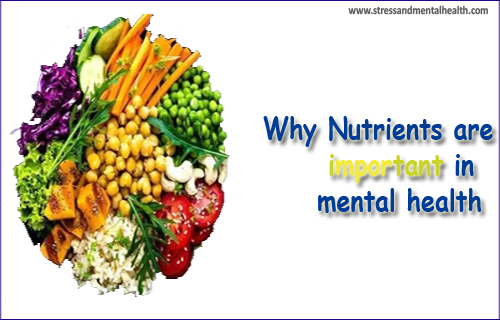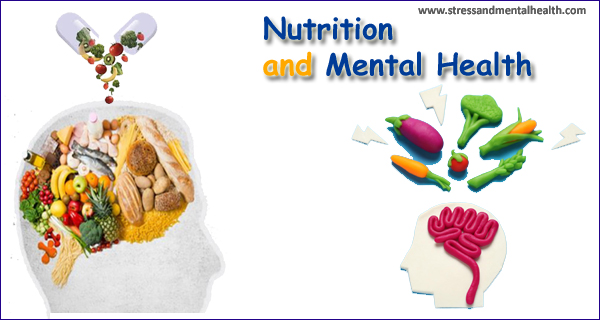Introduction
“Nutrition and mental health’ If we take nutritious diet, which bears appropriate quantity of carb, fat, protein, vitamins, minerals, fibers and fluid, it will help us to keep our body fit by maintaining healthy body weight, normal kidney, liver, and heart function and reduce the risk of developing chronic diseases. Good nutrients and food choices also affect our mood and mental health. It may also be called “Food Mood connection’”.
Nutrition and Mental Health
Nutrition and Mental Health have a great link with each other. Intake of proper and adequate nutrients is necessary for proper mental health. Thus there is a link between low levels of certain nutrients –such as folate, magnesium, iron, zinc, and B6, B12, and vitamin D- and worsening mood, feeling of anxiety, and risk of depression and so many other mental health-related problems arise.
First of all, we may clear the point whether consuming extra amounts of these nutrients in supplement form is beneficial for mental health.
Suppose if any person is deficient in magnesium. Taking supplements thereof might help improve symptoms. On the other side, someone is taking an adequate amount of magnesium in his diet, it is not clear, taking supplements thereof will be beneficial for him.
In the same manner Omega-3, fatty acids are essential fats and are necessary for brain development, cell signaling, and have an anti-inflammatory effect on brain cells. Due to the anti-inflammatory effect and importance in brain health, it has been investigated by scientists that omega-3 has a potential effect on mental health. Scientists have further found that omega-3 is also effective in the treatment of anxiety and depression in adults. It is not clear whether the use of omega-3 supplements can improve mood in most individuals.
Overall we do not know what optimal doses are for various populations and long-term safety and its effectiveness. So, experts advise in taking the majority of these nutrients through a healthful and mixed diet. In case a person is unable to meet his nutrients needs through diet he may consult a dietician or doctor to discuss whether the supplement is beneficial for him or not.
Another possible explanation is that diet may affect the bacteria in the gut, which refers to the gut microbiome. Healthy bacteria in the gut produce approximately 90 % of the neurotransmitter serotonin, which affects mood. Further research has also shown that there is a link between a healthy gut microbiome and lower rates of depression. What we eat, same may be affecting our mental well-being.
We may be clear that what we eat not only affects our physical health but affect our mental health and well-being also. Eating well means having a balanced diet full of vegetables and nutrients- can get a better sense of well-being and mood.
Why nutrients are important in mental health?

A balanced diet can reverse the depletion of key nutrients and can heal and nourish the body and brain. Certain foods and lack of certain foods can more likely make mood imbalance. Some foods stabilize mood and reduce stress and anxiety, improve sleep. So a balanced diet plays a vast role in better mental health.
How nutrients affect anxiety
In certain people, certain foods or food additives can cause unpleasant physical reactions, and these physical reactions may lead to shifts in mood including irritability or anxiety.
How does lack of nutrients affect mental health
Scientists researcher says that poor diets play a role in worsening mood disorders, such as anxiety and depression. However diet rich in green vegetables, fresh fruits, and olive oil can improve the symptoms of anxiety and depression.
What vitamin deficiency causes anxiety and depression?
Vitamin D deficiency can include depression, anxiety, irritability, and fatigue.
How does nutrients affects depression?

In the brain, Tryptophan affects the level of the neurotransmitter. Low carbohydrate diets are liable to precipitate depression, while the production of brain chemicals serotonin and tryptophan which promote the feeling of well-being is triggered by carbohydrate-rich food.
How does nutrients affect the brain?
Nutrients and a balanced diet attract good function of our brain. Balanced food which contains fatty acids, antioxidants, vitamins, and minerals nourish the brain and protect the same from oxidative stress-( the waste produced when the body uses oxygen, which can damage brain cells).
What foods improve mental health?
To boost mental health we must focus on eating plenty of foods and green leafy vegetables along with foods rich in omega 3 fatty acids, such as salmon. Dark green leafy vegetables are brain protective. Nuts, seeds and legumes, beans, lentils are also the best brain foods.
What foods are bad for mental health?
Processed meat, fried food, refined cereals, candy, pastries, high-fat dairy products are caused anxiety, tension, and depression
How does food affect your emotions?
Food that is full of protein such as, fish, beef, chicken, beans, eggs, and unsweetened yogurt has been linked to higher levels of dopamine and norepinephrine, the brain chemicals which play a role in your mood motivation, and concentration.
What foods are bad for your brain?
Below mentioned foods are not good for the brain,
- Sugar drink
- Refined carbohydrates include sugars, and highly processed grains, such as white flour.
- Food is high in trans fat.
- Highly processed food.
- Alcohol
- Fish high in mercury.
FAQ
Q. What is the role of nutrients in mental health?
Ans. Nutrients play important role in contributing to the prevention of mental health problems and their management, recovery from mental ailments, and development of a healthy brain.
Q. Food and mood mental health?
Ans. About 95 % of our body’s serotonin is made in the gastrointestinal tract that helps in regulating sleep and appetite, mediates moods, and reduces pain. Serotonin is made in our gut by bacteria. Thus a healthy and well-balanced diet plays an important role in it.
Q. Diet and its effect on mental health?
Ans. The quality of the meal you eat directly affects the structure and function of the brain and finally, your mood. So we must take appropriate nourishing meals daily.
